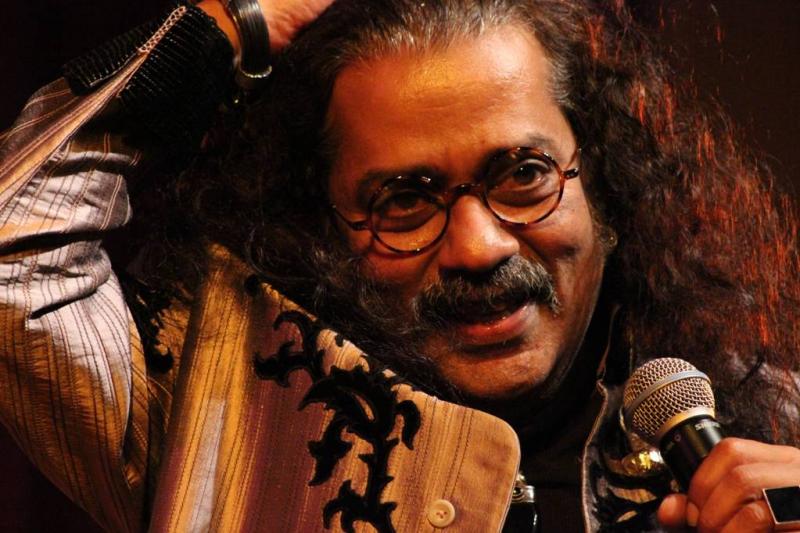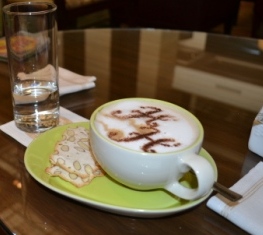Interview: Hariharan | reviews, news & interviews
Interview: Hariharan
Interview: Hariharan
The Indian star singer on how to stay innovative, the genius of AR Rahman and the satanic nature of the internet

Hariharan gives the appearance at least of being fabulously laid-back when I meet him in the lobby of one of Mumbai’s top five star hotels. Wearing a jaunty hat, he is recognised by a lot of passers-by, and when he orders a cappuccino HH is fashioned artfully from chocolate in the foam (see photo below right).
Now 56, for the last 30-odd years he has been one of India’s best known and most innovative singers. He’s had the Hindi Bollywood hits, but also has recorded for films in the South of India “at least 800 Tamil songs”, as well as Malayalam, Kannada, Marathi, Bhojpuri and Telugu songs. Hariharan released a series of highly regarded semi-classical ghazal recordings and has sold truckloads of discs of his fusion outfit Colonial Cousins, which he set up with Leslie Lewis. He’s also worked with Bollywood’s most celebrated contemporary composer AR Rahman since his earliest films Roja and the controversial Bombay (which had a Hindi-Muslim love story at its centre). He has, as one Indian magazine put, it “broken the barricades of states as well as musical genres.” He makes a selection of his music at the end of this piece.
People think I’m mad, but also traditional. You have to keep yourself innovative and make sure your music interests you
Hariharan will be performing next week as part of the Southbank's Alchemy Festival (in partnership with the peerless Darbar Festival, the Indian classical season which comes to the South Bank in September). He will perform favourites from Bollywood films and his collaborations with AR Rahman alongside tabla maestro Bickram Ghosh and star percussionist Sivamani. The trio are accompanied by Indian Jazz pianist Stephen Devassy, who is the only Indian pianist apart from Rahman to have performed with the London Philharmonic Orchestra.
Hariharan’s parents were “orthodox Carnatic musicians” (Carnatic, South Indian classical singing being entirely different from the better known northern Hindustani classical tradition, which he studied in Bombay). “So you could say I was born to be a musician." Born in Trivandrum in Kerala, he was brought up in Bombay, so he had exposure to both traditions “as well as the film music and Western pop of the time – from the Beatles to Abba.”
 An important string to his bow is his ghazal singing, a genre that is entirely in Urdu, yet another language he had to learn. He keeps pushing the boundaries by trying new things, lately a style he calls Urdu Blues. His son, meanwhile, keeps him up to speed with electronica and he is excited by the possibilities of “Electro-Indian” music. As he puts it: “People think I’m mad, but also traditional. You have to keep yourself innovative and make sure your music interests you, you have to bring something new to the table and people will follow you.” While he does make smoother and more conventionally appealing music, current projects include an album with percussion maestro Zakir Hussein, and he guests on a remarkable forthcoming new Latin-Indian fusion album by Pandit Dinesh, recorded in Havana, Mumbai and London.
An important string to his bow is his ghazal singing, a genre that is entirely in Urdu, yet another language he had to learn. He keeps pushing the boundaries by trying new things, lately a style he calls Urdu Blues. His son, meanwhile, keeps him up to speed with electronica and he is excited by the possibilities of “Electro-Indian” music. As he puts it: “People think I’m mad, but also traditional. You have to keep yourself innovative and make sure your music interests you, you have to bring something new to the table and people will follow you.” While he does make smoother and more conventionally appealing music, current projects include an album with percussion maestro Zakir Hussein, and he guests on a remarkable forthcoming new Latin-Indian fusion album by Pandit Dinesh, recorded in Havana, Mumbai and London.
He worries the classical traditions are being eroded and the suspects the internet “is the work of the devil”, reducing conversation and “trampling over lives and careers” of musicians. He points out that even 10 years ago, CDs of his were selling half a million copies.
He says the breakthrough film of AR Rahman, the Mani Ratnam film Roja (see video, below) in 1992 was “a new sound, it changed the music. But it’s about time there was a new sound again today.” Of Rahman he says “he is an elevated soul, there’s something very clean about his energy. Part of him is very pious, he doesn’t let the pressure get to him.”
Hariharan also knows how to “slip out of pressure” – last year for example he opted out of work for 40 days on a singing retreat at his farmhouse outside the city. “I never worry people will forget me if I disappear for a while. It recharged the batteries – I know how much I benefitted from that.” He says part of his apparent laid-back approach is that he was brought up in Bombay. “Outsiders have to fight a pitched battle to make it here and are more aggressive. But we Bombayites are not so in awe of the city.”
Hariharan will be appearing at Southbank Centre's Alchemy Festival on 19 April 19
Hariharan makes a selection of recommended listening from his vast catalogue for the the benefit of theartsdesk readers:
Ghazals
Kaash: http://gaana.com/#!/albums/kaash-hindi
Hazir: http://gaana.com/#!/albums/hazir
Lahore Ke Rang Hari Ke Sang: http://gaana.com/#!/albums/lahore-ke-rang-hari-ke-sang
Colonial Cousins new Album “CC once more”: http://gaana.com/#!/albums/once-more-hindi
Hindi Songs
Aye Hairathe: http://www.youtube.com/watch?v=DHRrATGVcTY
Yaadein: http://www.youtube.com/watch?v=4TwybzBNcFI
Roja Janeman: http://www.youtube.com/watch?v=AMCyAFACSWU
Tu Hi Re: http://www.youtube.com/watch?v=FH7OXblvPg8
Tamil
Nila Kaigiradu: http://www.youtube.com/watch?v=O_xsYnsNoIg
Sutum Vizhi: http://www.youtube.com/watch?v=fNJuHWUY9cA
Nee Thungum Nerathil: http://www.youtube.com/watch?v=uSkTWQW57_s
Poi Solla Kudadu Kaadhali: http://www.youtube.com/watch?v=rnp2h0s9BvI
Vaaji Vaaji: http://www.youtube.com/watch?v=PdJ1bmXeUk4
Explore topics
Share this article
The future of Arts Journalism
You can stop theartsdesk.com closing!
We urgently need financing to survive. Our fundraising drive has thus far raised £49,000 but we need to reach £100,000 or we will be forced to close. Please contribute here: https://gofund.me/c3f6033d
And if you can forward this information to anyone who might assist, we’d be grateful.

Subscribe to theartsdesk.com
Thank you for continuing to read our work on theartsdesk.com. For unlimited access to every article in its entirety, including our archive of more than 15,000 pieces, we're asking for £5 per month or £40 per year. We feel it's a very good deal, and hope you do too.
To take a subscription now simply click here.
And if you're looking for that extra gift for a friend or family member, why not treat them to a theartsdesk.com gift subscription?
more New music
 Benson Boone, O2 London review - sequins, spectacle and cheeky charm
Two hours of backwards-somersaults and British accents in a confetti-drenched spectacle
Benson Boone, O2 London review - sequins, spectacle and cheeky charm
Two hours of backwards-somersaults and British accents in a confetti-drenched spectacle
 Midlake's 'A Bridge to Far' is a tour-de-force folk-leaning psychedelic album
The Denton, Texas sextet fashions a career milestone
Midlake's 'A Bridge to Far' is a tour-de-force folk-leaning psychedelic album
The Denton, Texas sextet fashions a career milestone
 'Vicious Delicious' is a tasty, burlesque-rockin' debut from pop hellion Luvcat
Contagious yarns of lust and nightlife adventure from new pop minx
'Vicious Delicious' is a tasty, burlesque-rockin' debut from pop hellion Luvcat
Contagious yarns of lust and nightlife adventure from new pop minx
 Music Reissues Weekly: Hawkwind - Hall of the Mountain Grill
Exhaustive box set dedicated to the album which moved forward from the ‘Space Ritual’ era
Music Reissues Weekly: Hawkwind - Hall of the Mountain Grill
Exhaustive box set dedicated to the album which moved forward from the ‘Space Ritual’ era
 'Everybody Scream': Florence + The Machine's brooding sixth album
Hauntingly beautiful, this is a sombre slow burn, shifting steadily through gradients
'Everybody Scream': Florence + The Machine's brooding sixth album
Hauntingly beautiful, this is a sombre slow burn, shifting steadily through gradients
 Cat Burns finds 'How to Be Human' but maybe not her own sound
A charming and distinctive voice stifled by generic production
Cat Burns finds 'How to Be Human' but maybe not her own sound
A charming and distinctive voice stifled by generic production
 Todd Rundgren, London Palladium review - bold, soul-inclined makeover charms and enthrals
The wizard confirms why he is a true star
Todd Rundgren, London Palladium review - bold, soul-inclined makeover charms and enthrals
The wizard confirms why he is a true star
 It’s back to the beginning for the latest Dylan Bootleg
Eight CDs encompass Dylan’s earliest recordings up to his first major-league concert
It’s back to the beginning for the latest Dylan Bootleg
Eight CDs encompass Dylan’s earliest recordings up to his first major-league concert
 Ireland's Hilary Woods casts a hypnotic spell with 'Night CRIÚ'
The former bassist of the grunge-leaning trio JJ72 embraces the spectral
Ireland's Hilary Woods casts a hypnotic spell with 'Night CRIÚ'
The former bassist of the grunge-leaning trio JJ72 embraces the spectral
 Lily Allen's 'West End Girl' offers a bloody, broken view into the wreckage of her marriage
Singer's return after seven years away from music is autofiction in the brutally raw
Lily Allen's 'West End Girl' offers a bloody, broken view into the wreckage of her marriage
Singer's return after seven years away from music is autofiction in the brutally raw
 Music Reissues Weekly: Joe Meek - A Curious Mind
How the maverick Sixties producer’s preoccupations influenced his creations
Music Reissues Weekly: Joe Meek - A Curious Mind
How the maverick Sixties producer’s preoccupations influenced his creations
